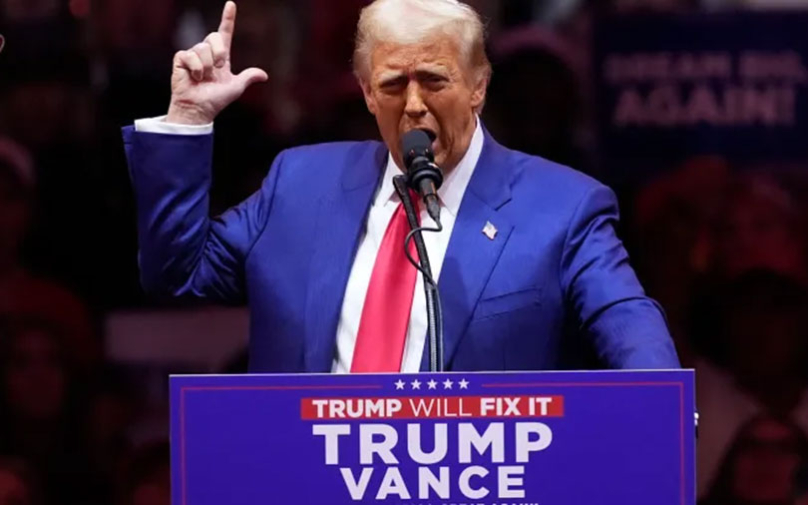Newly elected U.S. President Donald Trump plans to implement a wide-ranging conservative agenda during his first 100 days in office, according to a Newsville analysis.
Trump will return to the White House in January after securing 270 Electoral College votes and winning key states in his race against Vice President Kamala Harris. This victory comes four years after he lost to President Joe Biden. In his victory speech, Trump referred to the win as a “mandate” to carry out a series of significant policies.
Stronger Congressional Support than 2016
Trump will need Congress’s cooperation to execute his agenda. However, the Republican majority in both the Senate and the House of Representatives is now more supportive of Trump than it was in 2016. Still, a few moderate Republicans may present obstacles to the more radical parts of his policy plans.
During his first 100 days, Trump is expected to focus on fulfilling some of his key campaign promises, particularly regarding immigration and the economy, as well as appointing key Cabinet members.
Economy and Immigration: Key Priorities for Trump’s Administration
The economy was a crucial issue that secured Trump his second term, so it is expected to be a top priority in his first 100 days. Polls showed that many Americans were dissatisfied with the country’s current direction, with the economy being a major concern during Trump’s campaign.
Trump has advocated for tax cuts and the elimination of tipping taxes. According to Axios, House Republican Majority Leader Steve Scalise indicated that House Republicans will prioritize tax reductions, cutting “excessive regulations,” and reducing government spending.
Immigration is also likely to be a major focus in Trump’s early days in office.
Trump spokesperson Caroline Leavitt stated on Fox News that mass deportations of illegal immigrants would be on the agenda from day one. According to NPR, Trump could achieve this by rolling back Temporary Protected Status (TPS), which allows migrants to legally work in the U.S., or by expanding local police involvement in deportation programs. However, these efforts will face significant challenges.
The American Immigration Council estimated that such mass deportations would cost $7.3 billion and would likely be met with legal and logistical hurdles.
Boosting Oil Production and Fracking
On his first day in office, Trump also pledged to ramp up oil production and fracking. This issue proved particularly important in Pennsylvania, a state he narrowly won. “I want to close the border and drill, drill, drill,” Trump said at a rally in December of last year.
In a memo, Scalise also outlined a priority to “unleash American energy” by mandating lease sales, opening federal lands for “expanded energy exploration and production,” and rolling back environmental policies from Biden’s Inflation Reduction Act.
Taking on the “Woke” Agenda
In the ongoing culture wars, Trump promised to sign an executive order on his first day that would ban schools from teaching “critical race theory” or promoting “gender madness.”
Republicans have also proposed legislation to prevent schools from discussing sexual orientation and gender identity with certain students, arguing that these topics should be handled by parents, not educators.
Promising to End the Ukraine War in 24 Hours
Trump has stated that he would aim to bring Russia and Ukraine to the negotiating table on his first day in office. “Russians and Ukrainians are dying. I want them to stop dying. And I will fix it in 24 hours,” Trump said at a rally last year.
While experts are skeptical that the war could end on day one, Trump, as president, would have significant power to reshape U.S. policy toward Ukraine. Under Biden’s administration, the U.S. has consistently supported Kyiv in its defense against Russia’s invasion, which began in February 2022.
As the war enters its third year, Trump may take steps to reduce U.S. aid to Ukraine, having been critical of Biden’s handling of the conflict.
Key Appointments
Trump’s early days in office will likely include appointing key Cabinet members. It is expected that he will soon begin narrowing down candidates for roles such as Attorney General and positions overseeing the Treasury, Defense, and Homeland Security departments.
Following Trump’s victory, one of the first major announcements was the appointment of his senior campaign advisor, Susie Wiles, as Chief of Staff—a position that does not require Senate confirmation.
There has already been significant speculation about who Trump might pick for other key roles. Robert F. Kennedy Jr. has emerged as a potential candidate for some high-profile positions.

